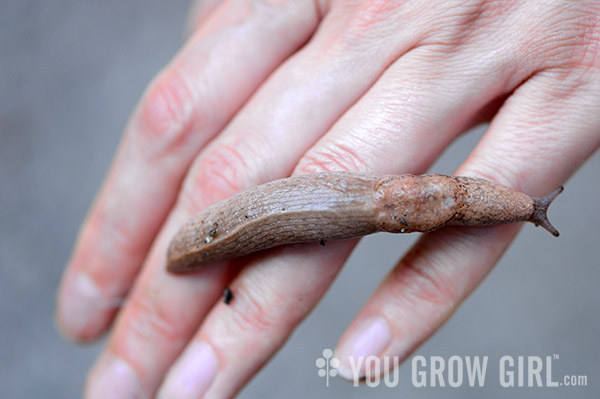
This is how it started (sort-of): Three years ago I found Tobacco Hornworms making a meal of some of my tomato plants. I was fascinated and repulsed. I grabbed my camera and took a few pictures, and then, like a good gardener, I immediately killed them.
It wasn’t long before I regretted that action. I’ve killed a lot of creepy crawlies in the garden, almost all of them by hand. There are many insects that will devour my crops if given the chance and I tend to be the most determined in situations where the insects are invasive, where their population will become unmanageable in subsequent years if I don’t step in and end their lifecycle.
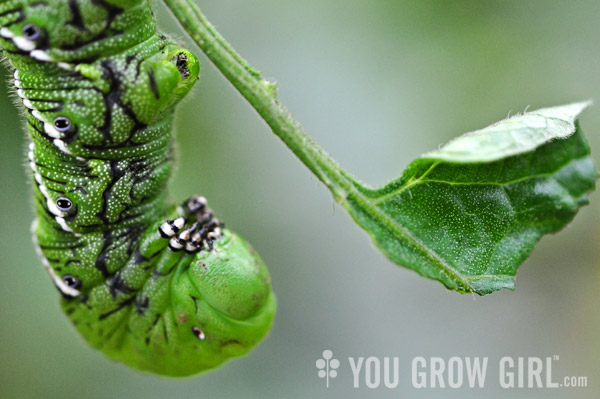
This is something I am neither proud nor ashamed of. It is just what I sometimes do as a gardener. I won’t qualify that with the words “have to do”, because frankly, it is always a choice. Sometimes, for specific reasons, I choose to kill specific insects. But this particular killing troubled me. I was ashamed of my behaviour that day and the unease it created lingered. Yes, they were devouring a few of my plants and, yes, I can get very defensive about my beloved tomatoes. What bothered me was that I jumped into a me versus the enemy mentality so quickly. Too quickly. I contained it long enough to take a few pictures, and yes, in the moment I did admire their terrifying beauty. However, I could have chose a different route, but I set aside my natural inclination towards curiosity and wonder in favour of a knee-jerk reaction.
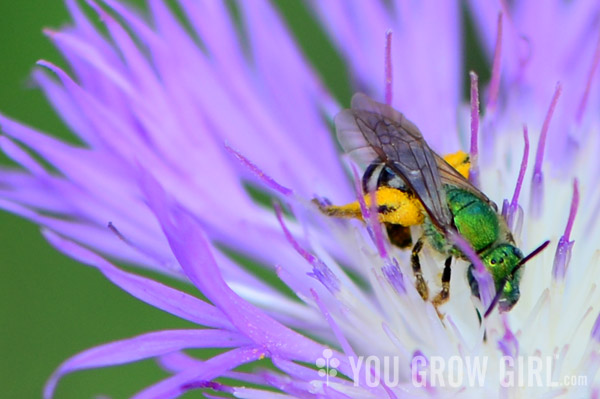
I don’t like the language of warfare that is used — that I have used — around gardening. There’s a lot of territorial posturing, protecting the home team, battling the enemy, taking down any critter that dare invade my private space. The Tobacco Hornworm Incident was not the single defining occasion that shifted my thinking, but it was a critical one that caused me to evaluate my headspace and ask myself if this was a paradigm that I wanted to continue in.
Change is not easy, even when you want it and actively push for it. Once I became aware of the mindset I was operating from, I began to wonder how much of it I actually believed and how much was a conditioning that I fell into without engaging my own skills of critical thinking or assessing if it aligned with my value system. I’d bought into a way of thinking about gardens and the natural world that went directly against my lived experience, and had gone on to unknowingly perpetuate a paradigm that I didn’t even agree with. I cringe sometimes when I read things I have written in books. Things about “insect warfare” and “fending off the enemy.” It’s not that I don’t think that some insects are indeed pests. It’s not that my crops aren’t important. I continue to kill some insects most days. What I don’t like is the way I took on the language and attitude of war. I don’t like the territorialism of it. As if the garden and every living thing that enters it is my right to do with as I please. I have come to see that I belong to the garden; it does not belong to me. The war mentality suggests a domination or ownership that prevents me from belonging and sets deep limits on my experience as a gardener and as a living creature that is a part of it.
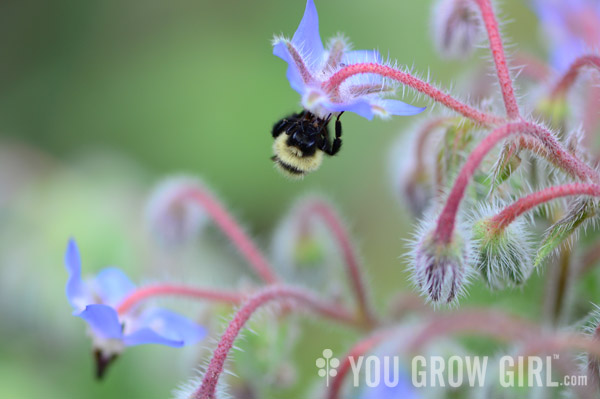
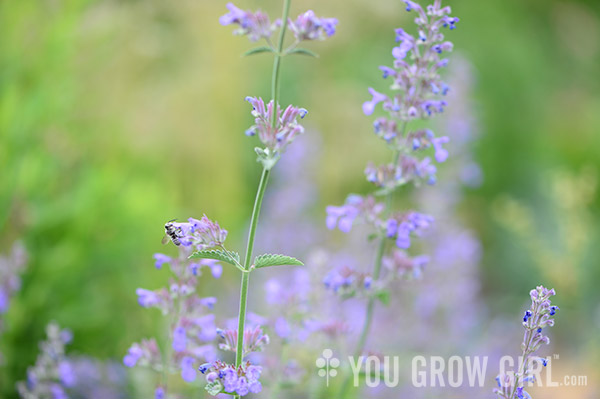
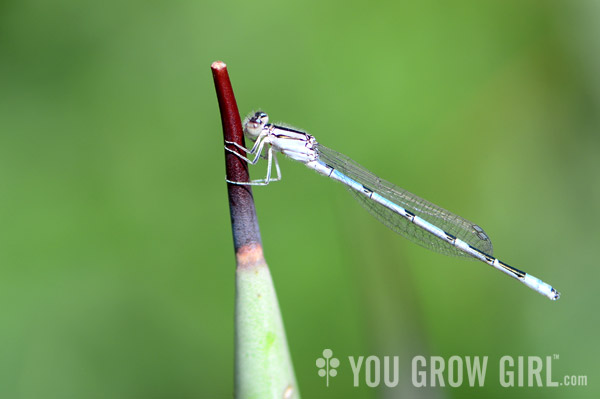
My attitude moving forward is not that I can’t kill insects. There is still life and death in the garden and sometimes it is by my hand. Instead, I am committed to being more actively aware of what it is that I am killing and why. I set out with that goal years ago, but I took that knowledge and kept operating within the war paradigm by categorizing all of the insects that came into the garden into two basic columns: good and bad. Binaries.
My approach now is more holistic than ever, although it is also a process in which I am always learning and adapting. Gardening holistically is about reaching a balance. Or at least an attempt to. If one insect population is out of balance it is usually because something else in the garden is also out of balance. It could be that the growing conditions aren’t good for that particular plant and it has been weak, making it an easy food target for a specific plant-eating insect such as aphids. Or it could be that there just isn’t enough of a specific predator in the garden to manage its population. Unfortunately, we can’t control the weather and some years just aren’t good years for some plants and crops. Sometimes the climate shifts and becomes amenable to a particular insect, allowing it to thrive in a way that it wasn’t able last year and may not next year. Achieving homeostasis in the garden makes the so-called bad insects just as valuable as the beneficials. Wiping out a pest sends their predators off to other pastures, which makes space for the original pest to gain traction again. From that perspective I prefer to have a few of both predator and prey around.
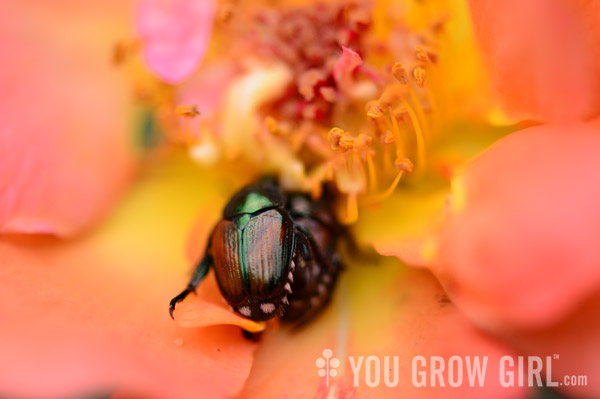
Along with this change of heart and perspective has come the realization that it’s not life or death for me if a particular crop isn’t abundant in any given year. I’m not a monocropping farmer who has their livelihood in corn or wheat. If the tomatoes don’t thrive in one year, I just won’t have as many to eat. Chances are good that I’ll still have loads of beans, greens, and zucchinis so it’s not as if we’ll starve. It’s frustrating and disappointing, but also okay if I have to make up for the loss by purchasing elsewhere. It’s also okay if we just don’t have it at all. So what if the lilies look ragged this year and the hostas have a few holes. They’ll begin anew in the springtime and it will be as if none of this ever happened. The point is: I’ll live. Recognizing that has made it easier for me to loosen up a bit on the warfare attitude and enjoy the garden for what it is, as it is. Surprisingly, there are a lot more experiences to have, things to learn about, and moments to appreciate within this more open and accepting space. It has allowed me to become a more easy-going gardener. I make less apologies for the garden’s imperfections as well as my own. It has allowed me to stretch and grow a curiosity about insects of all kinds, regardless of whether they are good or bad. They are all fascinating creatures to learn from and discover rather than an enemy to eradicate on sight.
For the most part, there are no enemies in my garden anymore. We’ve not all morphed into happy, rainbow, magical cartoon friends either. We just are. The insects, the plants, the garden, and me. All of us a part of the same thing.
I love this post! I too sometimes do things in the garden that I’m not proud of and then I realize that it is nature’s house, not mine. I still try to control the really destructive pests but I also try to let the garden’s ecosystem work for me. I see tomato hornworms, but they are almost always covered in parasitic wasp eggs, so I know they are already on their way out with no intervention needed. And sometimes I see that one has survived when I see a beautiful sphinx moth in the garden even while I’m still enjoying more tomatoes than I can eat. And, even though I do pick off Japanese beetles by hand, I admire their beauty. Thank you for writing this.
If I had waited rather than rushing to eradicate, those tobacco hornworms probably would have been parasitized eventually since there is so much diversity in my garden. One of my regrets was that I saw the sphinx moth in the garden before the caterpillars appeared and really appreciated it. But then when the caterpillars showed up my response was to get rid of them. That made me think that I needed to start analyzing my reactions more closely and finding a balance between awe and destruction.
Enjoyed this post. And I agree. I do admit I destroy every japanese beetle I see on my roses, beans, and raspberries. They have become so numerous that I have had to tear out a beautiful rose because I would find thirty to fifty beetles on them every day and never got to see a blossom. So I figured that I had better do my part to bring their destructive overpopulation down. But I cannot kill the catterpillars of butterflies. The year after we had a drought, I noticed a huge decline in butterflies. And the numbers still haven’t gone up much. So I always leave them or move them to other host plants or plant extra (like dill). As you allude to, sometimes we just have to learn to live in balance, in harmony. It is a give and take sometimes, within reason. Sweet post. I liked your spirit.
The Japanese Beetles are a beautiful menace. Another beetle that has no natural predators here. Another reason why I wish I could keep chickens (they’re not legal here).
I too felt bad and stopped killing insects. Here’s what I do. I keep a long Dairy Queen plastic spoon in my garden. When I find insects I don’t want I laddle them up and hold the spoon in one hand and flick the spoon with a finger. This way, I can propel them in my neighbor’s yard much farther than with my hands :-)
To clarify: I don’t feel badly about killing insects. I accept that it is sometimes required. I was uncomfortable in this particular situation because it was done unconsciously and without engaging my critical mind to really choose whether or not it was necessary or whether there were other options available. I did it in a reactionary way that was in line with the warring mentality that I was still holding onto… and also in service to my egocentrism, which I had to confront. As long as I am doing it consciously, conscientiously, and with a sense of responsibility for my actions and the depth of what they mean, it is something that I feel neither ashamed nor proud of. It just is.
You’ve beautifully expressed something I’ve been feeling for many years. …it’s all part of nature. I do sometimes intervene…especially if it’s the dreaded lily beetle…grrrrrrr but my main approach is to take pains in nuturing as best I can, hoping that will provide the strength for the plants I grow to survive.
I too kill lily beetles as a very regular occurrence. I do it because they are an accidentally introduced species and have no predators. In a way, I have become their replacement predator.
I enjoyed this introspective post. Even though I apply no chemicals to kill off anything in the garden, many insects meet their demise at my hands, or shoes, or pruners. Some of them even drown in my birdbaths. I feel particularly bad about that and have placed 2 [attractive, black, home-grown] floating bamboo canes in each shallow vessel to offer a life raft to something small that came for a drink and fell in. This hot month, many afternoons in a row, I observed a large, striking black and white wasp visit my terra cotta birdbath for a drink. I feel happy to see it finding refreshment.
I rarely kill something just because it showed up. I need to connect it to excessive damage, or recognize it as a clear threat (Japanese Beetle, king size slug). Each year I see at least one completely new insect, a fact of which I am proud. I don’t always know if it’s a desirable or undesirable insect, speaking from a crop protection point of view, but the diversity seems to be valuable and telling, an indicator of the receptive nature of an organic oasis in suburbia. And if I am luring insects by cultivating this safe place, it could be viewed as cruel to kill them. During my Master Gardener training in the early 1990’s, I vividly recall one instructor saying “Plants can withstand a few holes being chewed in their foliage. Don’t run for a can of spray every time you see some damage.” I ponder this remark regularly.
Sidebar: I am admiring on a daily basis the silvery beauty of 2 Velvet Red tomato plants, grown from seeds that journeyed here from your back yard. : > ) Not all seedlings displayed the silvery tones, a possibility you mentioned, and I was careful to choose the loveliest to keep and grow. These plants really stand out for their foliage. Fruit will be harvested shortly, icing on the cake. And as seedlings they withstood a barrage of flea beetle attacks in late May. Healthy! Vigorous!
I said in a previous comment above that I do not feel badly about killing insects when I am doing it “consciously, conscientiously, and with a sense of responsibility for my actions and the depth of what they mean,” but yes, I do feel badly when I leave a bucket out and it rains and then I find floating bees and such inside. That’s due to my mistake.
I like what you said about being proud about the new insects. That is something that I am experiencing more than ever with my current garden. The wealth of diverse life this garden attracts feels like my greatest accomplishment.
Glad to hear that you are enjoying the Velvet red tomato plants!I’ve grown many fuzzy and fancy tomatoes varieties, but this one continues to be my favourite.
This is lovely. I have been thinking more along these lines when it comes to “weeds” and “volunteers” in my garden. When I first started gardening I pulled pretty much anything that I hadn’t intentionally planted without even really looking at it. Now I put a lot more thought into it, and enjoy many of the surprises in my garden. I think it is partly moving from a goal of controlling what goes in the garden to thoughtfully managing what goes on in my garden.
In response to your reply to my comment earlier: Oh man, I wish we could have chickens too. We (people who wanted chickens in our city) took it to city hall a couple years ago, but the mayor squashed it right away. He thinks it is a step backyard, like we will become hillbilly-ville and it will ruin house values and there will be run-away chickens everywhere. I say that it is a step in the right direction and that it is forward-thinking because this is the way a lot of people are starting to lean. We tried voting him out of office. Maybe someday. I did not realize chickens eat japanese beetles. Now I want them even more.
Well said. The connection of gardening to war is often more than metaphorical. It is real when you consider that our synthetic fertilizers (non-organic) grew out of the surplus of chemicals that remained from WWII. The killing (just like war) hurts us all when you consider damage to the environment and damage to pollinators.
Fantastic post. Well said! As a rosarian who chooses to not spray but encourage a balance in the garden instead, I often feel sickened by the “if it flies it dies” mentality of so many other rose gardeners. Thank you for writing this.
Well said, Gayla. I the thought you have put into this.
Such a great post, one which refreshingly articulates something I’ve felt for a while but haven’t yet given voice to except maybe in the case of weeds. For me this is the only attitude to adopt as regards my garden, where it stands within the natural order of things, and my part in all that. Thank you!
I wish I had your mindset. I try to encourage beneficial insects in my garden, but when it comes to pests I just can’t stay put. I use home-made pest and weedkillers, but I still feel like a barbarian. It’s true that some pests posses intricate beauty, but I just can’t tolerate them in my garden. There are times when I find caterpillars and beetles and just collect them and drop them off somewhere far from my garden. Your post inspires me to become a better person and seek balance within myself and then in my garden. Maybe someday I’ll be tolerant and wise like you. Thanks for sharing.
Thank you for writing about this! This yr. w the drought I am finding plenty of “garden destroyers” that have me pulling my hair out!!. I wanted to KILL the chipmunks for ruining a perfectly beautiful flat of pea shoots that I grow for local eateries and this year have a rabbit problem that I haven’t had in the past five years -that for some reason digs up every single one of 30 liatris bulbs the minute I plant them-3x now!- so that I had to repot them all and baby, indoors until four or 5 inches tall …and then put up makeshift Barriers to try to keep them out, from eating everything down to their roots….RINSE AND REPEAT all summer! Immediately after cursing particularly destructive chipmunks this year, I found one floating in my rain barrel -(which is impossible to get into so they must’ve climbed up the overflow pipe) and was saddened. I didn’t actually want them dead I just wanted them to live somewhere else ! I’ve tried catching all of them to drive to the woods somewhere miles away- to no avail -but DO have a solution for all the grubs – that the skunk is leaving big craters in my lawn at night trying to dig up, and giant slugs and the worm you showed… After encouraging the robins in the spring to continue to raise their young in an (inconvenient )spot and being patient until fully fledged, I swear they know me and know that I am a friend not a foe! They fly away when anyone else comes into my backyard but me and have taken to following me around while I dig and throw them worms! . Now when I find the big fat juicy White grubs that turn into next year’s beetles, I save them all in a jar of dirt and toss them to the robins at sunset when they come back for dinner. The whole family now lines up on the fence And waits for me! So I’ve taken to doing the same with slugs and giant produce eating worms and handpick and keep in a jar until I go to my community garden plot where there is a large gaggle of Canada geese -who love love love to chow down on them and are now also following me around and come right up to my car when I arrive…the slug lady!! Keeping fresh water that’s accessible to all the animals in my little patch of woods also helps keep them from poking big holes in a tomato and then leaving it to rot the way wasteful squirrels/geese do when they’re thirsty…after three 3 yrs. of home remedies I think I finally “won the war” this yr. w the sawfly larva dessimating my roses that I wait all winter for, to bloom -and then the rabbit came and ate 9 BUDS READY TO OPEN all in one day! The rabbit causes more damage than all insects combined, the Japanese beetles -that I have no problems squishing and leaving for the ants- get handpicked regularly every yr. …and this yr. on Georgian Bay (zone 4a-b) are the least of my problem! (I like to think I make a good dent in their population by hand picking at least 50-100 over the course of the whole summer)….but the rabbit thinks my garden is a salad bar and after 3 mos. of very slow growing hollyhocks this yr., ate every single leaf off over a dozen plants before I noticed-ending this yrs. possibility of hollyhocks….if anyone has any pointers for this little 2lb. Marauder other than a total chicken wire encasement, I’d love to know! Anyone had any luck w an old fashioned propped-up-box-on-a-stick trap? Thank u! LOVE your posts!